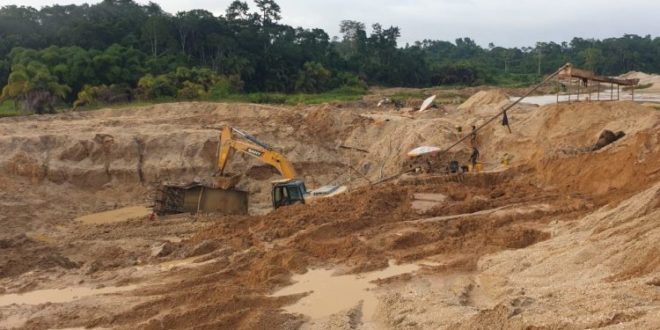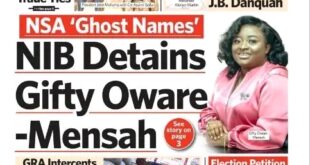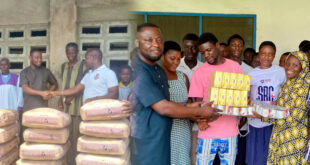Civil society groups last week ramped up the campaign against illegal mining, commonly called galamsey in local circles, as they mounted perhaps the biggest pressure on government to end the unfolding environmental calamity.
With the Ghana Water Company Limited revealing that its plants risked breaking down as a result of processing heavily polluted water from the main river sources due to galamsey activities across the country, there has not been a greater chance to compel the political leadership to clamp down heavily on illegal mining and its actors.
Indeed, the culprits of illegal mining have always walked away into the comfort of their gold-laden pits from where they dig the natural resource with careless abandon, while political actors engage in unfortunate drama.
Sometimes, the debate has bordered on sheer comedy or outright insensitivity to the seriousness of dissipation of forest reserves, pollution of arable lands and water bodies, and contaminating them with heavy and poisonous substances, including mercury and cyanide.
As some civil society organisations indicated during last week’s agitations against illegal mining, it is time to commit the major political actors to a grand plan that incorporates their commitment to fight the menace.
Three of the leading figures in the 2024 general election have dedicated chapters of their separate development blueprints, also called manifestos, to their plans for the mining industry.
The governing New Patriotic Party (NPP) and the opposition National Democratic Congress (NDC) have both stated their plans to promote responsible mining, while former Trade Minister, Alan Kyerematen, stated in the Movement for Change’s Great Transformational Plan that he would “eliminate galamsey within a period of two years” upon coming to power.
NPP’s vision
The NPP said its next administration would “usher in a golden age for Ghanaian-owned small-scale mining for wealth and jobs, and promote responsible and sustainable small-scale mining, including addressing illegal small-scale mining”.
It said it would do this by making available proven reserves data to small-scale miners to help deal with the associated problem of trial-and-error digging for gold; simplifying the small-scale mining licensing regime; scaling up the use of the mercury-free gold catcher machine technology, which is less damaging to our environment; and ensuring strict adherence to the relevant mining laws and regulations to prevent illegal and improper mining practices.
NDC ideas
The NDC said it would introduce a “Restore Ghana Initiative” to deal with the issue of galamsey-impacted lands and water bodies through a comprehensive land and water-based rehabilitation and pollution control programme; reclaim and convert impacted land into viable agricultural farmlands; increase the national forest plantation cover through creative measures.
It said it would also re-categorise mining in Ghana into small-scale, medium- scale, and large-scale, each with tailored regulatory, operational, environmental, and safety requirements; promote sustainable small-scale mining as a profitable and responsible business, especially for young people by enforcing regulations and applying state-of-the-art technology, including AI, to track all excavators and geo-fence all SSM concessions in Ghana.
The party further stated that it would ensure that mining operations were not conducted in unapproved areas, such as water bodies, while ensuring that concession holders rehabilitate impacted areas.
Alan’s plan
The efficient and effective management and control of Ghana’s natural resources, has the greatest prospect of transforming the country’s socioeconomic development.
The business model for the exploitation of these resources has since independence, been controlled by foreign commercial interests, with very little impact on Ghana’s development.
Mr Kyerematen, in his blueprint document, said his administration would develop and implement a new business mode! for dealing with illegal mining by facilitating the establishment of small-scale mining companies to be owned by groups of young people currently engaged in galamsey, and grant the small-scale mining companies licensing rights, appropriate equipment and other facilities, technical and managerial assistance, as well as access to organised marketing and distribution channels.
Analysts’ opinions
But five political analysts said the parties’ commitment to the fight against illegal mining must impact the endorsement of the electorate at the December 7 polls.
A Senior Lecturer of the Department of History and Political Science of the Kwame Nkrumah University of Science and Technology, Dr Kwasi Amakye-Boateng, said “galamsey is a political problem, and it’ll take politics to eradicate it”.
“The consciousness of Ghanaians should be elevated to match the level of destruction of the general environment,” he said.
Dr Amakye-Boateng stressed illegal mining had become an important subject for the electorate currently given the magnitude of the practice and the impact on the environment, as well as the threat to life in the country.
He said it would, therefore, impact the choice of the electorate in the December elections.
“The fight against galamsey should be a political fight to effectively affect political outcomes,” he said.
Mussa Dankwah, the Executive Director and Head of Global InfoAnalytics, a global research group, said although galamsey had not been a major issue for voters for the 2024 general election, the current attention forced by media focus and civil society pressure could draw voters attention to it.
“Although galamsey has not been highlighted as a key election issue for the 2024 elections, the recent media, civil society and labour unions focus is likely to draw voters’ attention to the menace, and could elevate the galamsey issue to be one of the election issues, especially in the mining regions and constituencies,” Mr Dankwah, known for his work in electoral polling, said.
He said if galamsey becomes a critical factor in the 2024 elections, it would have the most impact on the Western Region.
“Critical analysis of the data point that the region to be mostly impacted would be the Western Region. In the 2024 parliamentary election, several seats that were lost by the NPP in the Western Region were from the mining constituencies.
The only mining constituency seat the NPP retained was Tarkwa-Nsuaem. If galamsey becomes an election issue again in the region, it could put the Tarkwa-Nsuaem seat under threat,” Mr Dankwah explained.
He said the latest poll put the NDC in a strong position to win the Western Region, galamsey could make the situation even worse for the governing NPP.
“The recent poll from the region, according to Global InfoAnalytics, shows that the opposition candidate leads in the poll in the region with 52 per cent, and the ruling party’s candidate on 39 per cent.
Galamsey issues could make the race a very difficult one for the ruling party in the region, come December 2024,” he stressed.
A governance expert and Chief Executive of the John Agyekum Kufuor Foundation, Prof. Baffour Agyeman-Duah, said “the dangers and threats posed by galamsey, our political leaders must see it as a national issue, not a parochial or partisan one. Elections should be no reason for them to condone the practice”.
He said as the menace continued to grow in size, “both in coverage area and numbers over the years, galamsey has become a political force on its own to influence election outcomes”.
Prof. Agyeman-Duah said the separate manifestos of the major parties for the December 2424 elections “are short on strategies to fight what has truly become an existential threat to the nation”, while their campaigns, so far, had been largely silent on the issue.
“The galamseyers have taught both the NPP and NDC a political lesson: don’t mess with us if you want to win our votes! Obviously, this warning has been taken seriously,” he explained.
A Senior Lecturer in Political Science at the University of Education, Winneba, Dr Maliha Abubakari, said galamsey might be “an important deciding factor for most elite voters in several key ways”.
“Overall, how parties address this complex issue could play a critical role in shaping voter decisions in the 2024 elections,” she said.
“Political parties that propose clear, enforceable plans to address illegal mining could gain voter support,” she said, adding that “many Ghanaians, especially in rural communities affected by illegal mining, see this as a top priority.”
Dr Maliha Abubakari further asserted that other factors such as economic considerations where galamsey provided a source of livelihood for many could become a political landmine for the parties.
“How political parties address this economic aspect — by offering alternatives to mining — could sway voters who rely on it for income,” she said.
She emphasised, however, that “the current government’s handling of the issue will likely be scrutinised. If the ruling party is seen as ineffective in curbing galamsey, opposition parties may use this as a campaign point to win over dissatisfied voters”.
Dr Abubakar said communities suffering from the environmental destruction caused by illegal mining might favour candidates who prioritise environmental protection and sustainable practices.
Political scientist, Dr Samuel Kofi Darkwa, said the debate over illegal mining could play a significant role in the December 2024 elections.
Dr Darkwa cited the inadequate measures adopted by the governing NPP and the opposition NDC in the fight against galamsey, referencing corruption and collusion in some cases.
“Given the current government’s record and that of the opposition NDC in the fight against galamsey, hopefully, Ghanaians may be open to a third-force party if it can provide a credible alternative to the galamsey crisis and other challenges facing the country,” the academic said.
He said the ideal choice of the electorate “would need to offer practical solutions to issues such as illegal mining, economic development, unemployment, infrastructure, and social welfare.
It should prioritise inclusivity, transparency, and genuine accountability in governance, as well as demonstrate a commitment to addressing societal problems with integrity and effectiveness”.
THANK YOU for constantly reading stories on MyGhanaMedia.com, a news publishing website from Ghana. Kindly like, follow, comment, and SHARE stories on all social media platforms for more entertaining updates!
Follow us on Twitter: https://twitter.com/
Source: MyGhanaMedia.com
There are four types of content published on MyGhanaMedia.com daily: curated content; syndicated content; user-generated content; and original content.
 MYGHANAMEDIA.COM Best Source Of Latest News
MYGHANAMEDIA.COM Best Source Of Latest News





